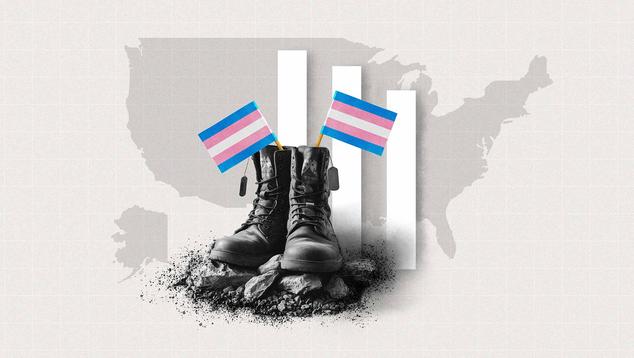WASHINGTON, D.C. -- A majority of Americans, 58%, continue to favor allowing openly transgender men and women to serve in the U.S. military, but support has declined from 71% in 2019 and 66% in 2021. The latest reading is from a Gallup poll conducted as President Donald Trump took two executive actions -- one on his first day in office and another a week later -- to reinstate a ban on openly transgender service members.
The overall drop in support for transgender military service is driven by Republicans and, to a lesser degree, independents. The current 23% of Republicans who back openly transgender men and women serving in the military is down from twin 43% readings in 2019 and 2021. Meanwhile, independents’ 62% support is significantly below the 78% reading in 2019 but similar to the 66% from 2021. Democrats’ backing for transgender military service currently stands at 84% and has been generally steady since 2019.
Transgender men and women were first allowed to serve openly in the U.S. military when a ban was lifted in mid-2016, during the last year of Barack Obama’s presidency. A year later, in his first term, Trump tried to ban transgender individuals from serving in any capacity in the U.S. military. After legal challenges to this policy, transgender military personnel were allowed to continue to serve, but new transgender recruits were allowed to serve only in their gender assigned at birth. Gallup’s 2019 finding of 71% support for transgender service followed this decision.
Shortly after he came into office in 2021, Joe Biden reversed Trump’s ban, thereby allowing transgender Americans to serve openly. Several months after Biden’s action, support registered 66%. The latest data are from a Jan. 21-27 poll, which began the day after Trump was inaugurated for a second term. Trump’s recent executive orders aimed at banning transgender people from serving in the military are being challenged legally.
Nearly Eight in 10 Support Women Serving in Combat Roles
The recent poll also finds most Americans supportive of women serving in combat roles in the U.S. armed services, a policy recently in the news because Pete Hegseth, Trump’s pick to lead the Department of Defense, had publicly voiced opposition to women in combat before his nomination.
The 78% of U.S. adults who think women should be allowed to hold combat jobs in the military -- which has been policy since 2015 -- includes majorities across party lines. Democrats nearly unanimously support women in combat (94%), while 80% of independents and 60% of Republicans agree.
During his confirmation hearing, Hegseth said he supported women in combat if they can meet standards that are high and equal to those of men. He was confirmed as defense secretary during the poll’s field period in a 50-50 Senate vote that required Vice President JD Vance to break the tie.
Gallup has asked this question once before -- in September 2007 -- prior to a policy shift during the Obama administration that led to women being allowed to serve in previously restricted roles such as infantry, artillery and special operations units. Although a similar 74% of Americans supported women serving in combat in 2007, differences in partisans’ views were smaller then than they are now. Republicans were more supportive in 2007 (68%) than in the latest poll, while Democrats were less in favor (78%) than now. Independents’ views were not significantly different.
As in 2007, men and women today are equally in favor of females in combat jobs.
Bottom Line
Republicans’ declining support for transgender military service has eroded overall support for it since 2021, though the latter remains above 50%. On the other hand, roughly the same share of Americans as in 2007 favor allowing women to serve in combat roles, with majorities of all party groups still supportive.
After Trump’s inauguration and Hegseth’s confirmation as defense secretary, the future of two groups -- transgender service members and women in combat roles -- in the U.S. military is uncertain. Although the military has recently made significant strides in improving recruitment numbers, it continues to face challenges that could be exacerbated by policies targeting transgender or women’s service in the armed forces.
To stay up to date with the latest Gallup News insights and updates, follow us on X @Gallup.
Learn more about how the Gallup Poll Social Series works.
View complete question responses and trends (PDF download).




